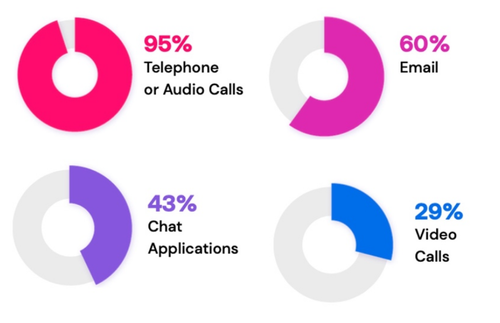
Chief Strategy Officer says artificial intelligence services and new automation processes, can raise work from home productivity.
A new report out from artificial intelligence cloud provider ASAPP reveals that 85% of customer service agents don’t want to return to the office. Currently 72% of Agents work from home 5 days per week.
Chief Strategy Officer Macario Namie said that “contact centres have the biggest opportunity in decades to advance agent productivity with artificial intelligence technology, new automation processes and workflows, which can also support CX workforce demands wherever they work.”
The company, which was recently chosen by Forbes as one of the top AI Companies shaping the future, has researched and developed a number of machine learning natural language processing and speech recognition models purpose-built for the contact center environment over the last 8 years. It provides a suite of AI services, applications and platform tailored for the industry to make people more productive.
“Appealing to the 85% of agents that want to work from home could stave off competition for employees from other industries and help reduce recruitment costs and attrition rates,” said Namie.
A recent legal case in the UK highlighted that the traditional way of thinking about work is being turned on its head with some contact centres out of tune with employees by not being in step with changes to employees’ work patterns. The Daily Mail reported that Essex Care Limited is required to pay nearly £16,000 to a former employee who suffered on health and safety grounds. Judge Eoin Fowell stated the employee’s boss was, ‘blunt, uncompromising, hostile and unsympathetic.’
Last year HSBC told 1,800 call centre staff they could work from home permanently, 1,200 took them up on the offer. Capita an international business process outsourcing firm with 16,000 call centre employees in the UK are also working from home, while competitor Teleperformance stated its 10,000 employees would be allowed to continue working from home beyond the pandemic.
The report also states that repurposing office space budget to invest in new technologies can fund a call centre organization to meets employees’ expectations for a modern employee experience that provides the best software tools to deliver the experience employees want to provide to consumers. The report estimates that 400 million square feet of American office space is being largely unused at a cost of £12 billion annually.
Several companies in the UK have already shed call centre real estate. Santander scrapped plans for a £75m Merseyside call centre for 2,500 employees. Travel group Saga put a 6.5-acre plot in Ramsgate, Kent up for sale that housed 600 call centre workers. Capita reduced its costs by £10 million with office closures during the first lockdown and has now permanently closed 49 offices globally.
Yet, for a number of companies, the technology challenges that arose during the pandemic were significant. Many agents reported that equipment and software were not always working, and phone calls were not routinely diverted correctly. The latest ASAPP reports confirms this with half of agents reporting that technological advancement in call centres is behind the times. “This will need a new investment in technologies that transform call centre agents’ productivity beyond the constraints of incremental technology,” said Namie.
While IT operations pulled off heroic feats during the pandemic, it was a patchwork fix, not a CX modernization. “Now with AI Native technology, automation is becoming easier to build and integrate with company systems…In fact, automation can be fused to agent’s live interaction with customers to make the experience for companies, employees, and customers significantly better,” added Namie.
The report cites that nearly 90% of agent want to see more aspects of their customer interactions automated including:
What tasks would you want automated?
Knowledge Search 44%
Bill Payment 38%
Conversation Summarization 36%
Address Change 34%

Chat, messaging, and video still have longer to go in the industry as the telephone still dominates customer conversation with 93% of agents report using the phone. However, the company points out that flatlining investments in digital channels reinforces a reliance on voice support, which is more costly for business than chat and messaging channels.
“That’s a major problem if companies need to scale their customer experience while ensuring higher agent productivity,” states the report.
The number of phone calls substantially rose because of the pandemic, yet messaging is how Millennials and Gen Z are communicating most often today—with 75% of Millennials avoiding phone calls altogether.
The report also asked agents about their personal lives asking if burnout has been an issue. Notably each different generation dealt with the pandemic differently. The older baby boom generation had the healthiest response to 2021 by relying less on food, alcohol, or drugs, notably in contrast with the up-and-coming Generation Z, who relied most heavily on alcohol and recreational drugs. The life experience of Baby Boomers sets them apart, while Millennials and Generation Z are more willing to try new hobbies.
To obtain a copy of the report visit: https://www.asapp.com/is-the-future-of-cx-at-homehttps://www.asapp.com/is-the-future-of-cx-at-home




